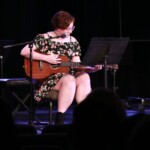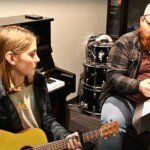Music can be a very important part of anyone’s life. Many reports have told us that there is a connection between music and academic achievement. For example, students active in the arts continue to out perform their peers on the SAT. It’s true, your child will probably never become a music virtuoso, the time that he/she spends practicing, singing in a choir, or playing in a band will contribute to their aptitude for problem solving, creativity, memory, coordination, and more! Below are listed six ways you can get the most out of your lesson each week.
- Know your learning style: Everyone learns in different ways. Some students progress better with peer interaction and in class motivation found in group classes while others prefer the focused one on one attention of a private lesson. When students are young, choose which of these two styles is going to be best for them. Once a student is more advanced it is necessary to take private lessons. This way the lesson can cater to their strengths, weaknesses, and musical taste of the student as they progress to a higher level.
- Professional environment: Choose a school where the environment is focused on music education and there are no distractions. School environments are also great because the student can be motivated by hearing their peers who are at different levels that they can look up to. You want to be in a place where lessons are not just a hobby for the teachers, but a career that is taken very seriously. Also, look for schools that offer theory classes, sight-singing classes, workshops, recitals, and performing opportunities to enhance your students experience and progress. Also, use some of the excellent materials (music books etc.) out there that have been developed by professional educators. It has been researched that these materials make learning easier for students.
- Start lessons at an appropriate age: For children, starting at the right age is the key to the success they will have with lessons. If a child is put into lessons too soon, they can feel overwhelmed and turned off to music, never wanting to take lessons again. If you have a preschooler who is really interested in music, get them involved in a toddler music program or dance class. Private lessons generally don’t work for younger children because they haven’t experienced learning in a formal classroom setting yet. Studies have shown that a child’s aptitude for music grows between birth and nine years of age, and the time between birth and five years is the most influential time. Starting with preschool programs is a great way to draw them in early. A child’s mental and emotional maturity determines the best time to start private lessons. A child is ready when he/she can focus for 25 minutes while participating in a variety of activities, accepts instruction, and follows directions.
As for learning the piano, experts recommend that children begin lessons between the ages of 4-6, depending on the child’s attention span and ability to retain material. For guitar lessons, it is recommended that children be between the ages of 5-7. Playing the guitar requires a large amount of pressure on the fingertips, which might be a problem for the small hands of younger children. Private voice lessons should wait until around age 9 or 10. Younger bodies are not usually ready for the rigors of vocal technique that comes with a private lesson.
- Make practice easier: Make practicing a daily routine. Do not practice longer then you can focus. Several short periods a day might be a great idea, especially for children. Set goals for yourself or your student to focus on. Pay attention to those instead of how much time is being spent on the practicing. Rewarding a student for good practicing can also be a good thing.
When practicing, a fun and different thing to do is record yourself playing/singing. This way you can see if your playing/singing matches your intentions.
- Participate in other music-related classes: Take another music class that isn’t performance based, such as music theory, composition, or history. This will help the student to understand the pieces they are performing in different ways. It provides the student with the opportunity to be enriched by other wonderful teachers and might help them to find an additional talent or interest.
- Make it fun: The focus on lessons should always be to HAVE FUN!! It should be an encouraging experience for the student. Focusing only on progress can turn younger children off from music. When a child starts to lose focus in a lesson or practice session, it’s time to change activities so that they will no become discouraged. Enroll your student in a program that teaches styles of music they are interested in so that it will not be “boring” to them.
Come check out the Omaha School of Music and Dance and see how your life, or your child’s life, can be enriched by music lessons! Go to our website, www.omahaschoolofmusicanddance.com and see all the different opportunities we have available for you today!



